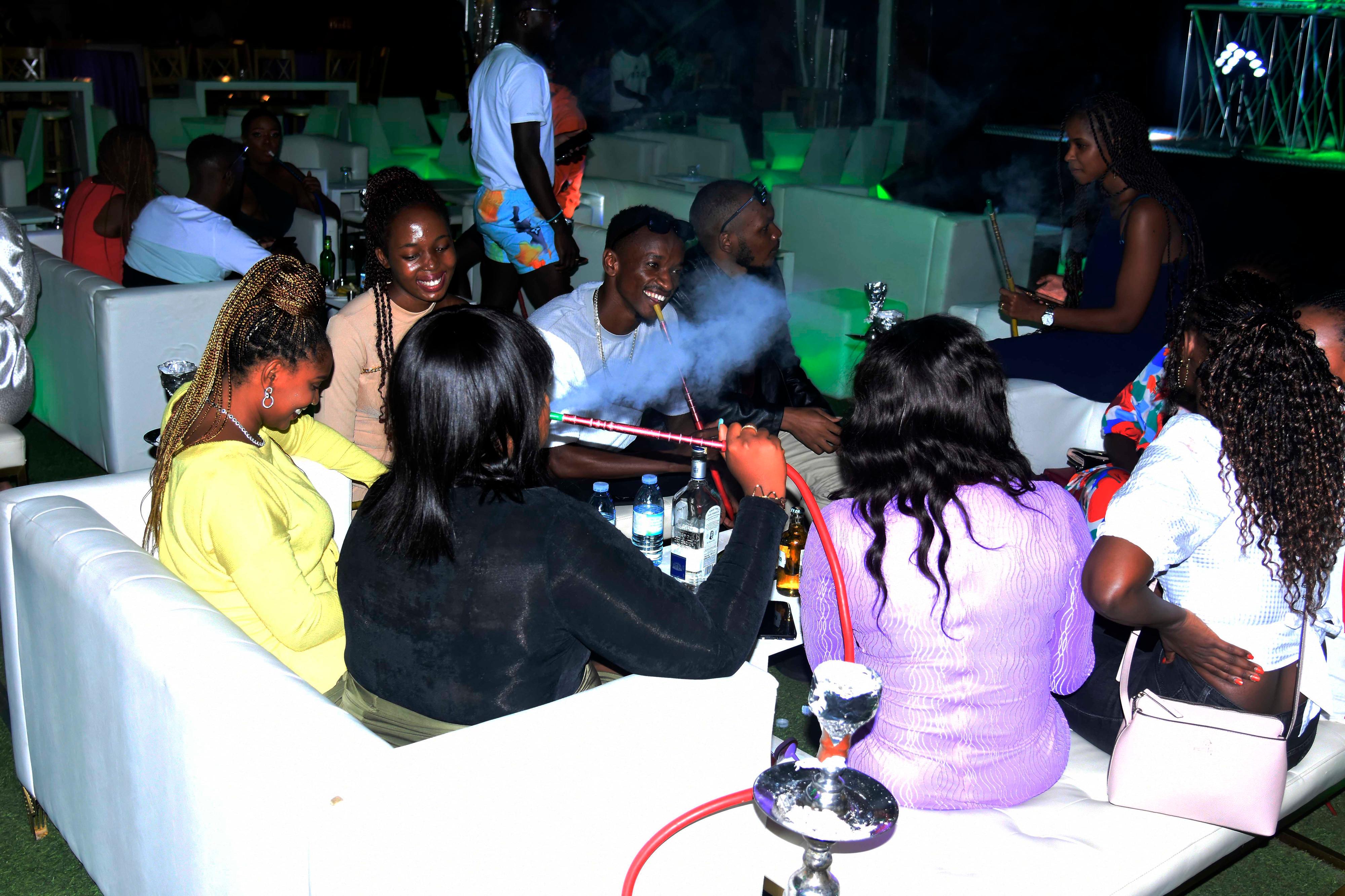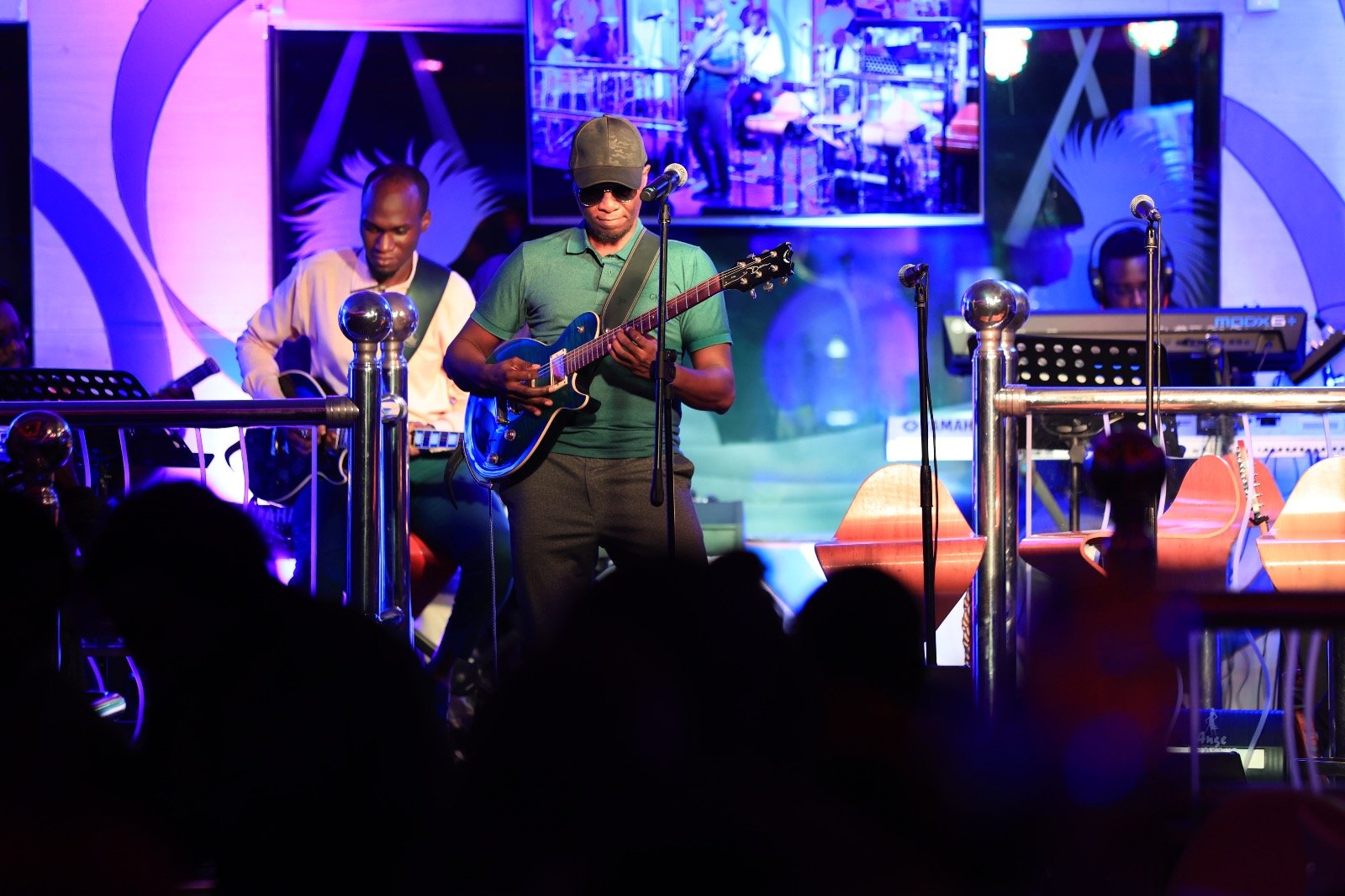
Revellers at the 2012 All White Party at Club Guvnor in Kampala. Photo | Michael Kakumirizi
Back in the day, First Street, Industrial Area, used to be punctuated with hangout places. Guvnor (Ange Noir), Club Silk, BJ’s Irish Pub, and Club Obligato offered limitless options to patrons. Currently, only Guvnor is still standing. But only just thanks to, among other social factors, the mushrooming of new and trendy residential suburbs. Tucked in the aforesaid suburbs are clubs whose free entry tag is particularly attractive to the Gen Z and millennial generations.
Once upon a time, places like First Street were the reason Kampala was christened East Africa’s entertainment capital. The Ugandan capital’s vibrant nightlife made it a magnet for nightclubs such as Tropicana 110, Club Clouds, Echoes, Pulsations, Levels Lounge, Mevek Lounge, The Garage, Gabz Bar and Lounge, and Luxe, among others.
That most of these hangout places are now spoken of in the past tense tells its own story. On May 17, management of Club Guvnor made clear that the pull was set to be pulled on the nightclub’s popular Saturday Night operations. A notice from management said “the club shall, however, remain available for hire on Saturdays for: private parties/events/concerts/product launches/presentations.”
Uganda’s premium nightclub will also remain officially open on Fridays for Friday Night Live with Afrigo Band (every last Friday of the month); Oldies Night, playing all the hits from the 70’s, 80’s, 90’s and the year 2000 (every first Friday of the month); Guvnor FriYAY with Aka Dope Band (every second Friday of the month); and Guvnor FriYAY with Afro Fusion Night (every third Friday of the month).
Heady days
Located on 1st Street Industrial Area, Jinja Road in Kampala, Guvnor, established by Charlie Lubega, a little over 25 years ago, is arguably Uganda’s swankiest nightclub. It boasts of four bars, four independent sections, top of the range sound, and a fully equipped ambulance, among others. Its DJs, who spin the best old music and the latest club bangers, include DJ Wasswa, DJ Mark Rebel, MC Moseso, DJ Pito, DJ Brian, DJ Lynda Ddane, DJ Meddie Kayz, DJ Fem, DJ Ivan, and DJ Jose.
“As the curtains fall on [Saturday Night Fever] @GuvnorUganda, a somber shadow blankets the memories of vibrant Saturday nights that once filled its walls with music, laughter, and joy,” actor and director John Segawa posted on X (formerly Twitter) immediately after the nightclub made the announcement.
“The echoes of revelry now fade into silence, leaving behind a void that special bookings can never truly fill. A chapter closes, carrying with it the collective heartbeat of a community that found solace and connection within those hallowed halls,” Ssegawa lamented.
During its glory days, the nightclub was busy on Tuesdays, Wednesdays, Thursdays, Fridays and Saturdays. Mr James Wasula, Afrigo Band’s CEO and director, told Saturday Monitor that recent developments shouldn’t come as “a surprise…because every village in Kampala has a live band that performs free shows.”
In the past, he reminisces, “we used to have fewer places to go to.” He lists Club Obligato, Ange Noir, and Club Silk. Nowadays, he further observes, “every village has an entertainment place and actually some villages have two places to go to, and there are no entry fees so as long as you buy a drink, you are home and dry.”
This is in part why Afrigo Band stopped performing at Club Obligato. Money was hard to come by, Mr Wasula confirms. He says it makes no sense to stay put at a place that has few patrons.
“We as Afrigo Band are now up for hire,” Wasula he discloses.
Mr Philip Luswata, an actor and playwright of renown, says while Guvnor’s decision has left him “in disbelief”, the warning signs had always been there for all to see.
“These iconic places of entertainment existed when they did because there was a sizeable population living in the city centre,” he reasons, adding, “These days, all the residential units on Dewinton Road and Buganda Road in Nakasero and Kololo, among others in Kampala, are either offices or broken down for rebuilding.”
Lost glory
Mr Luswata is also not in doubt about nightclubs losing their lustre along the way. There was a time, he recalls, when going to nightclubs was “touristic.” They kept “mutating” both in look and offerings.“
“When you went alone, you could dance the hours away while looking mesmerised, but then at one time it turned into a lounge where people booked seats as opposed to dance spaces,” Luswata notes.
James Kayemba, a 55-year-old businessman, says during the heyday of city-based hangouts Chez Joseph was his cup of tea. It was closely followed by “Tropicana, Clouds...and the discos.”
“I strongly believe the biggest contributing factor was Covid-19 and the attendant restrictions that drove people into alternative joints for solace and they ended up getting stuck there,” Mr Kayemba tells Saturday Monitor.
This is a point that Rugiirwa Katatumba, the chairman of the Bar, Club and Entertainment Owners Association Uganda, shares.
“Very many bars and nightclubs closed during and after the Covid-19 lockdown. More than 40 percent of bars have closed during and after Covid-19 lockdown. The entertainment and bar industry hasn’t been the same since,” Mr Katatumba said in an interview.
According to Mr Katatumba, their association has 5,210 members both in Kampala and the rest of Uganda. It employs around 120,000 workers. They usually turn in a profit by pushing the envelope with sales of alcoholic beverages. We were unable to sound out Jackie Tahakanizibwa, the Uganda Alcohol Industry Association (UAIA) chairperson, to find out if dying hangout places in Kampala’s city centre have impacted the country’s brewers.
Reinvention?
Mr Luswata says the “drop in resident population in the city” and absence of “a rapid public transport system” coupled with “high fuel prices” have created a perfect storm. This, however, doesn’t negate the fact that “people still want to be with and around people; people still want to party together; people still want to make new friends in new places or just to look at others having a great time.” It is because of this that Mr Kayemba is convinced that Mr Lubega, the owner of Guvnor, still has a trick or two up his sleeve.
“I don’t think ‘Charlie’ is done or on the way out,” Mr Kayemba says, referring to the Guvnor owner by his first name. “I think he is most probably reinventing something because he is the best known in this business, better than anyone around here. I think you just need to watch his space.”
Mr Luswata, however, has his reservations. Former disco-goers, he says, “are now paying top money in the gym to follow the dance moves of a dance instructor.”
He adds: “When we were young, we would watch Jesse Kakooza dance moves so we copy and look cool. He makes a good living from getting people to watch and copy his dance moves in the gyms today. So, people still want to dance.”
Asked whether people are going out less to enjoy nightlife in Uganda these days, Luswata says: “Many theatre lovers want to come to Kyengera to see plays at my theatre, but they are put off by how to get there. So, they are stuck to the neighbourhood lounge, which too, is not doing really well because the revellers would rather be somewhere else that city planning doesn’t allow them to get to.”
On whether Gen Zers and late millennials drink less these days, Luswata replies: “I once accompanied a friend to a bar in Kololo. The imbibing activity there was through the roof, and this is a costly space to drink from. But we looked very out of place. At best, we might have passed for the owners of the place because of our fatherly presence. They are drinking just as we did, but we are not planning for them the same as we were planned for by the elders of the time.”
When asked if the few music festivals are a viable alternative in Uganda, Luswata responds: “A festival is a celebration that brings together the many achievements in a given period. Imagine seeing the five best musicians of the year collaborating for your entertainment at one event! People will look forward to what next year will look like. Festivals can never be a replacement for regular creative and recreational engagements. They simply complement and the fewer the better.”
Changes
Alcohol-free bars have become more popular in England in recent years, indicating that some revellers are becoming teetotallers or cutting down on alcohol consumption.
“Nightlife is a very special, individual and spiritual experience. Alcohol has been very central to spiritual experiences traditionally for us as Ugandans, and is even biblically endorsed. In the West they have space for alcohol free bars,” Mr Luswata says.
“Here, we have restaurants for that. Mentally, the West can handle such spaces. Here, we can’t. Imagine a gathering of gender non-conforming people, he, she, they, them...how much alcohol would you need to stir things up at such an event? None. So the alcohol-free bar works for them. Not us,” he concludes.
The question on alcohol-free bars is debatable, Wasula argues. According to Wasula, Uganda is among the top countries in the world where alcohol is consumed to the maximum. “I do not know if we could be in the top 10 or 20. So, I don’t know if alcohol-free bars are really the thing. I doubt it. I am not sure I have not addressed my mind to it. People in Uganda enjoy their beer or call it alcohol.”
“So, the issue is about decentralising entertainment. Most areas have local live bands; forget about discos because Club Guvnor is a disco place. People do not enjoy discos anymore, where they can have live bands. So, the issue is that there is a transition now from disco to live bands. We are going back to live bands,” Wasula adds.
What they say...
Rugiirwa Katatumba, Chairman of the Bar, Club and Entertainment Owners Association Uganda
Very many bars and nightclubs closed during and after the Covid-19 lockdown. Over 40 percent of bars have closed during and after Covid-19 lockdown. The entertainment and bar industry hasn’t been the same since
James Wasula, Afrigo Band’s CEO and director:
We used to have fewer places to go to...nowadays, every village has an entertainment place and actually some villages have two places to go to, and there are no entry fees so as long as you buy a drink, you are home and dry
Philip Luswata, actor and playwright.
These iconic places of entertainment existed when they did because there was a sizeable population living in the city centre. These days, all the residential units on Dewinton Road and Buganda Road in Nakasero and Kololo, among others in Kampala, are either offices or broken down for rebuilding.




